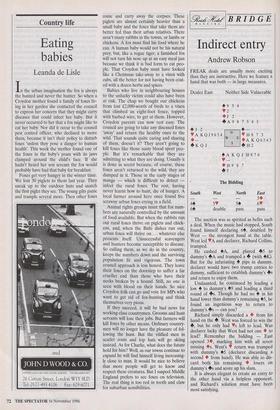Country life
Eating babies
Leanda de Lisle
Foxes get very hungry in the winter time. We lost 30 piglets to them last year. They sneak up to the outdoor huts and snatch the first piglet they see. The young gilts panic and trample several more. Then other foxes come and carry away the corpses. These piglets are almost certainly heavier than a small baby and the foxes that take them are better fed than their urban relatives. There aren't many rabbits in the towns, or lambs or chickens. A fox must find his food where he can. A human baby would not be his natural prey, but, like a rogue tiger, a famished fox will not turn his nose up at an easy meal just because we think it is bad form to eat peo- ple. That Croydon baby must have looked like a Christmas take-away to a vixen with cubs, all the better for not having been coat- ed with a dozen herbs and spices.
Babies who live in neighbouring houses to the unlucky victim could also have been at risk. The chap we bought our chickens from lost £2,000-worth of birds to a vixen that climbed an eight-foot fence, topped with barbed wire, to get at them. However, Croydon parents can now rest easy. The council are going to take any diseased foxes `away' and return the healthy ones to the wild. That sounds quite caring and sharing of them, doesn't it? They aren't going to kill foxes like those nasty blood sport peo- ple. But it's remarkable that they are admitting to what they are doing. Usually it is done in secret because, of course, these foxes aren't returned to the wild, they are dumped in it. Those in the early stages of mange — which is difficult to detect infect the rural foxes. The rest, having never learnt how to hunt, die of hunger. A local farmer around here once found five scrawny urban foxes crying in a field.
Animal rights groups insist that fox num- bers are naturally controlled by the amount of food available. But when the rabbits run out rural foxes thrive on piglets and chick- ens, and, when the Balti dishes run out, urban foxes will thrive on ... whatever else presents itself. Unsuccessful scavengers and hunters become susceptible to disease. So culling them, as we do in the country, keeps the numbers down and the surviving population fit and vigorous. The town council approach is less honest. They leave their foxes on the doorstep to suffer a far crueller end than those who have their necks broken by a hound. Still, no one is seen with blood on their hands. So nice Croydon folk can go and vote for MPs who want to get rid of fox-hunting and think themselves very pious.
If they succeed, it will be bad news for working-class countrymen. Grooms and hunt servants will lose their jobs. But farmers will kill foxes by other means. Ordinary country- men will no longer have the pleasure of fol- lowing the hunt. But the vilified men in scarlet coats and top hats will go skiing instead. As for Charlie, what does the future hold for him? Well, as our towns continue to expand he will find himself living increasing- ly close to man It would be nice to believe that more people will get to know and respect these creatures. But I suspect Middle England prefers to see foxes on television. The real thing is too red in tooth and claw for suburban sensibilities.


















































































 Previous page
Previous page